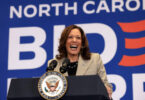By Sebastian Jaramillo
Boston University Statehouse Program
A large group of dignitaries held a ceremonially groundbreaking at the Boston Common on Wednesday for the “Embrace,” a sculpture commemorating the moment when Dr. Martin Luther King Jr. and his wife heard he had won the Nobel Peace Prize in 1964.
Wednesday was the 95th anniversary of the birth of Coretta Scott King and the completed sculpture is set to be unveiled on January 15, 2023, the 94th anniversary of the birth of the civil rights leader.
The 20-foot-high, 40-foot-wide sculpture depicting four interlacing arms, marks the first monument erected on the Common in 125 years, when a memorial featuring the 54th Regiment, the first all African-American volunteer regiment of the Union Army, was unveiled in 1897, said the Rev. Liz Walker, co-founder of King Boston, which selected the sculpture by Hank Willis Williams, out of 126 submissions.
“Now we know history, and we are making history today,” said Walker. “But it is not enough to know history. It must conspire, provoke, elevate, anger, and teach us. History must move us. These are troubled times, but this day gives us great hope that we will learn from and embrace the lessons from our past.”
King Boston, a program of the Boston Foundation, has worked with the city of Boston and philanthropist Paul English on plans for a memorial. The ceremony was attended by a large number of dignitaries, including Gov. Charlie Baker, Mayor Michelle Wu, US Attorney for Massachusetts Rachael Rollins, and Boston Celtics player Grant Williams.
Baker joked the process of securing the necessary permits and licenses for the statue made it understandable why it was the first to be built on the Common in 125 years.
“This is a tough place to get something sited,” he said. “And I can’t think of a better way to break the dam than with this particular message that this embrace will send.”
Baker told the story of how King, a then Ph.D. student at Boston University, met his future wife, who attended the New England Conservatory, and convinced her to marry him. She was reluctant at first, but “his charm and his wit and his vision and his commitment, but especially his perseverance, won her over.”
Baker likened King’s perseverance in courting his wife to his unrelenting efforts to further the cause of civil rights of African Americans in the United States.
“This is a challenge and a journey in which perseverance above almost all else is a requisite to get from the beginning,” he said. “The speech that [Dr. King] gave [on the Parkman Bandstand] 57 years ago this month, 1965, 22,000 people, the mile of marchers from a playground in Roxbury, to that bandstand in the rain to make their voices heard about the fact that the time had come for radical change, not just here in Boston, but across the Commonwealth and throughout the country,” he said.
Rollins reminded the audience that without Coretta Scott King, there would be no Rev. Martin Luther King. She also spoke about the controversial surveillance from the federal government, which kept watch over King on the last four years of his life.
“You all know the stories there about what happened,” Rollins said, referring to King’s infidelities, which were caught on tape during the federal government investigation, “but this is about change and possibility.”
Rev. Jeffrey Brown, a Baptist preacher and co-chair of King Boston, closed the ceremony by quoting Mrs. King.
“She said that struggle is a never-ending process,” he said. “Freedom is never really won; you earn it and win it in every generation.”
This article originally appeared in the CommonWealth Magazine.





